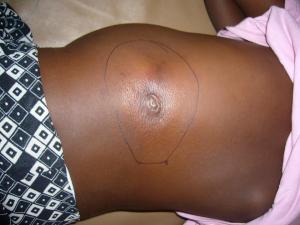Buruli ulcer: An infectious disease thriving in unsanitary environments
Abuja, 30 August, 2019 - “My daughter will never be beautiful again, flies follow her around all day. The stigma has made her drop out of school and the contractures make her limp. I am afraid she will not find the husband of her choice”, says Mrs Chizoba Obiaru of Okrika Local Government Area (LGA) of Rivers State.
A 58-year-old mother, Mrs Obiaru’s 17-year-old daughter, Chinenye Obiaru is one of the 500 cases of Buruli Ulcer (BU) reported in 2018.
“We have spent a lot on traditional medicine since February 2016 when the symptoms started showing. Without knowing what exactly the problem is, it was after some time that WHO officials visited our community, suggested it was BU and advised we seek medical assistance. I am glad she has now started her treatment”, she said.
Buruli Ulcer is an infectious chronic, debilitating, devastating infection of the skin and soft tissues caused by Mycobacterium ulcerans. It is the third most common mycobacterial disease of the immunocompetent host, after tuberculosis and leprosy and has been reported in over 33 countries around the world. BU is one of the Neglected Tropical Diseases (NTDs) targeted for control. The greatest burden of disease mainly thrives among very poor communities in the tropical regions of West and Central Africa, including Nigeria, which reported over 500 cases in 2018.
“The disease is popularly found in unsanitary environments, swampy and humid areas and the mode of transmission remains obscure, many people in Nigeria are not aware of it,” says Dr Anyaike Chukwuma, National Coordinator Federal Ministry of Health (FMoH).
“Potential reservoirs as well as vectors and transmission mechanisms vary from region to region depending on the epidemiological, social and local environmental context. We are working towards preventing the transmission of this debilitating illness in the country”, he adds.
The World Health Organization (WHO) classifies BU lesions into three categories according to severity. Category I lesions are single small lesions (e.g. nodules, papules, plaques and ulcers five centimeters in diameter). Category II lesions consist of non-ulcerative or ulcerative plaques, edematous forms and single large ulcerative lesions of 05–15 centimeters in cross-sectional diameter, while lesions in the head and neck regions and the face, disseminated and mixed forms including extensive lesions of more than 15 centimeters are considered as Category III.
In Nigeria, because many people do not know about BU, most patients are usually seen in category II and beyond. BU generally begin as a painless dermal papule or subcutaneous nodule, which, over a period of weeks to months, breaks down to form an extensive rotten ulcer with undermined edges. It mostly affects poor people in rural areas with limited access to health care. Children, under 15 years, are most commonly affected by the disease.
Up until 2004, the only curative treatment for BU was surgery, which consisted of wide excision to remove all infected tissues including some of the adjacent healthy tissues. Large lesions require skin grafting. With the introduction of potent antibiotics, management includes a prolonged course of antibiotics and surgical debridement. Early identification and treatment are key, as lesions heal with scarring that can be a significant source of morbidity.
According to Dr Suleiman Aliyu of WHO Nigeria, “WHO is supporting the FMoH towards creating awareness on the unpopular diseases”.
He reiterates, “WHO will continue to work with government to strengthen health systems, provide standardized case management including laboratory diagnosis, antibiotics, wound care, surgery and rehabilitative procedures. WHO will also assist in supportive activities including surveillance, supervision, research, monitoring and evaluation of control activities including advocacy, social mobilization and partnerships”.
Technical contacts:
Dr Oluwafunke Ilesanmi; Email: ilesanmio [at] who.int (ilesanmio[at]who[dot]int); Tel: +234 803 319 3137
Dr Suleiman Aliyu; Email:aliyisu [at] who.int (aliyisu[at]who[dot]int); Tel: +2348033883960
